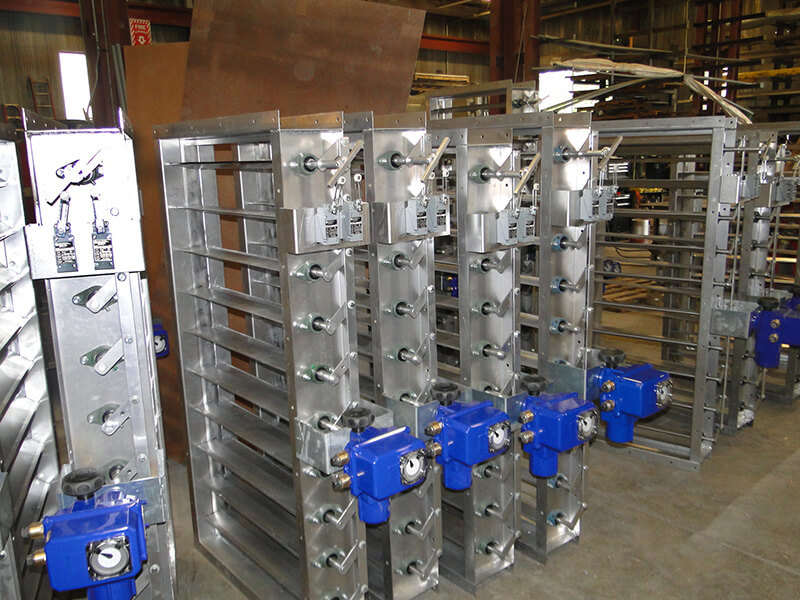 Industrial dampers play an important role in controlling airflow and maintaining optimal conditions in various industrial processes. These mechanical devices are designed to regulate the flow of air, gasses, or other substances in ducts, chimneys, and ventilation systems. Their proper functioning is vital for the overall efficiency of industrial operations.
Industrial dampers play an important role in controlling airflow and maintaining optimal conditions in various industrial processes. These mechanical devices are designed to regulate the flow of air, gasses, or other substances in ducts, chimneys, and ventilation systems. Their proper functioning is vital for the overall efficiency of industrial operations.
Common Problems with Automatic Industrial Dampers
When issues occur with industrial dampers, troubleshooting is essential for quickly identifying and resolving issues that may impact system performance and efficiency. The following are some common problems that may occur:
Damper Not Opening or Closing – One of the common issues faced with industrial dampers is the failure of the actuator not allowing the damper to failure to open or close as intended. This can disrupt the airflow and compromise the efficiency of the entire system.
Damper Not Sealing Properly – Inefficient sealing can lead to leakage, allowing unwanted substances to escape or enter the system. This not only affects the quality of the industrial process but can also pose safety and environmental concerns.
Damper Not Responding to Control Signals – Modern industrial dampers are often controlled electronically or pneumatically. If a damper fails to respond to control signals, it can disrupt the automation process and result in operational inefficiencies.
Damper Rust or Corrosion – Rust or corrosion on the dampers can compromise their structural integrity, leading to reduced lifespan and potential safety hazards.
Troubleshooting Industrial Damper Issues
Efficient troubleshooting involves a systematic approach to identify and address the issues with industrial dampers. Here are some essential techniques:
Visual Inspection – A thorough visual inspection can reveal obvious issues such as physical damage, misalignment, or signs of corrosion. Inspecting the damper in its operational state provides valuable insights.
Functional Testing – Testing the damper’s basic functions ensures that it opens and closes smoothly. This step helps identify any mechanical issues that may be hindering its operation.
Performance Testing (Leakage) – Performance testing involves checking for leaks during the damper’s operation. This is critical for dampers intended to seal off certain areas to prevent the escape of gases or other substances.
Maintenance Check – Regular maintenance checks, including lubrication and cleaning, can prevent issues before they arise. Scheduled inspections help ensure that dampers remain in optimal condition.
Steps to Troubleshoot Industrial Dampers
Step 1: Determine the specific issue affecting the damper’s performance. This could be based on observed symptoms, system feedback, or alarms.
Step 2: Conduct a visual inspection to identify any visible damage, misalignment, or signs of wear. Documenting the condition is crucial for effective troubleshooting.
Step 3: Verify the damper’s functionality through controlled opening and closing operations. Note any resistance, irregular movements, or failure to respond to control signals.
Step 4: Based on the inspection and testing results, proceed to repair or replace damaged components. This may involve replacing seals, lubricating moving parts, or addressing electrical issues.
Step 5: After repairs or replacements, conduct another round of testing to ensure that the damper operates as intended. This step confirms the effectiveness of the troubleshooting process.
Air Systems is Your Industrial Damper Specialist
Resolving issues with industrial dampers is a critical aspect of ensuring the efficiency and safety of industrial processes. Air Systems is your industrial dampers specialist and source for custom manual or automatic dampers, for a wide variety of industrial air process applications.
The benefits of using Air Systems for your Industrial damper needs include:
- Custom design with quick delivery
- 75+ combined years of application experience in the industrial market
- 100% of orders are designed to customer specifications
- Wide range of designs, configurations, sizes and materials
- Proven quality and reliability with over 10,000 industrial dampers in service
Contact Air Systems to discuss your industrial damper needs.

